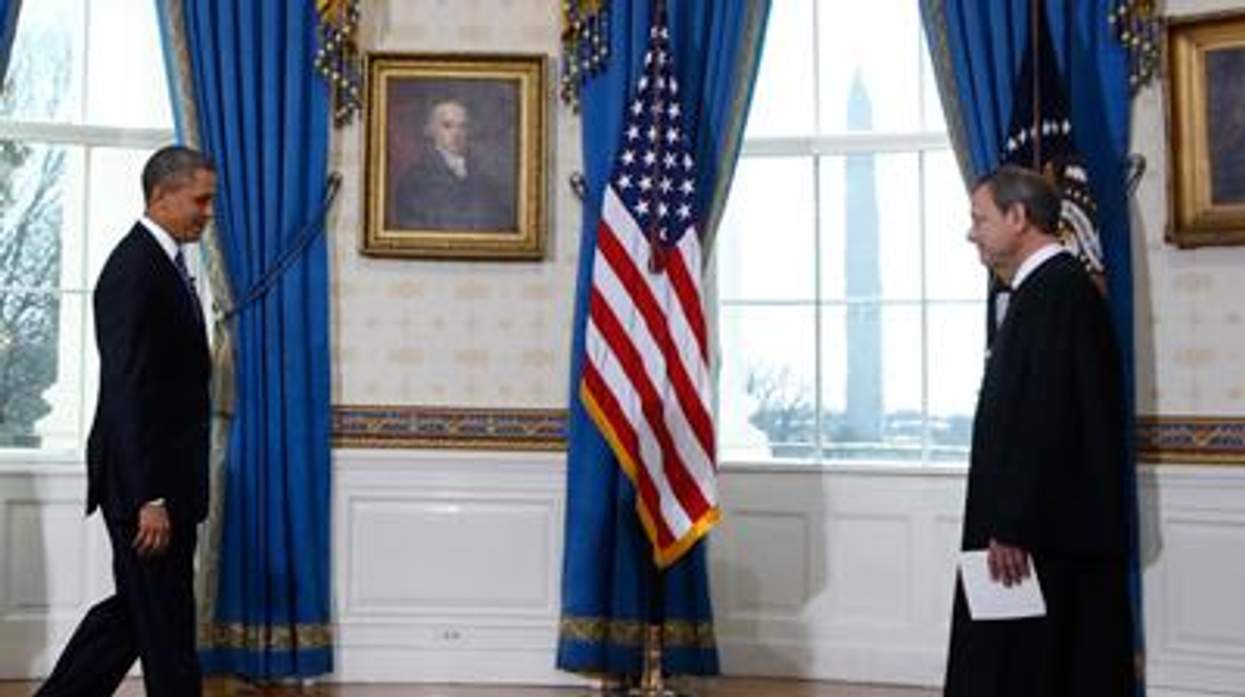WASHINGTON, D.C. -- The nation met Edith Windsor last week. Clad in a pink scarf and blowing kisses to a throng of supporters, Edie, as many call her, politely excused herself from the spray of reporters armed with cameras and recorders and eager to capture a bit of her dazzle.
"There are a lot of people over there who came to see me," she explained, "and I just want to go see them."
Americans from coast to coast were undoubtedly charmed by her, just like the national media has fallen for her and she had LGBT Americans at "Hello."
Windsor is likely to get her money back and, goodness knows, she should. But it's still an open question whether that will be because the justices strike down the Defense of Marriage Act or because the court decides it does not have jurisdiction to rule and so leaves in place the federal district court ruling that favored Windsor.
That left me wondering, if it's the latter and DOMA still stands, when will LGBT Americans get redress? In marriage. In federal benefits. Heck, in anything and everything.
A day after the cases, a Time magazine cover quickly declared, "Gay Marriage Already Won -- The Supreme Court Hasn't Made Up Its Mind But America Has." That's great -- I, for one, am glad to have America on board. And after having the good fortune of being in the thick of the maelstrom last week, I can say beyond doubt that our community has every reason to be proud of our showing.
But what of the laws -- those pesky little details that still govern our lives?
In Hollingsworth v. Perry, the justices seem inclined to issue a narrow, California-specific ruling or even dismiss the case altogether, which would leave Judge Vaughn Walker's district court ruling in place and restore same-sex marriages to California.
Though neither of those two outcomes would do much for same-sex couples in other states, if the justices issue some decision -- even a narrow one -- it would be definitive and nudge the law in the direction of equality, which would be incredibly helpful down the road. (And no, I am not even entertaining the possibility that they uphold Proposition 8.)
A similar dilemma arises with Windsor v. USA. The justices could duck DOMA by deciding they don't have the jurisdiction to rule because there's not a real dispute in the case (i.e. the Obama administration agrees with the district court ruling that found DOMA unconstitutional even though the administration appealed it to the Supreme Court). In that case, the IRS would have to return Windsor's money but DOMA would still be intact, leading to future litigation.
If the court takes that route, Anthony Romero of the American Civil Liberties Union says the justices know what's on the horizon.
"You will have successive case after successive case in front of judge after judge until everyone in America has their equality," he says. "So the question is whether they will have the courage of their convictions to do what's right in one fell swoop."
It was an interesting choice of words that took me back to a moment in court when Chief Justice John Roberts wondered why President Barack Obama hadn't simply gone all the way on DOMA and just stopped enforcing it if he deemed it unconstitutional.
"If he has made a determination that executing the law by enforcing the terms is unconstitutional, I don't see why he doesn't have the courage of his convictions," Roberts charged, "rather than saying, oh, we'll wait till the Supreme Court tells us we have no choice."
It's worth noting here, as Lambda Legal's Jenny Pizer reminded me, that San Francisco mayor Gavin Newsom did have the courage of his convictions when he and the city's lawyers determined California law to be unconstitutional and started issuing marriage licenses in 2004. The California Supreme Court promptly told him it wasn't appropriate and said he should have taken the issue to court to test it -- as the Obama administration is now doing at the federal level.
But the question remains, which branch, or maybe more appropriately, who will prove to have the courage of his convictions? The chief justice? The president? As Bill O'Reilly aptly noted about our plight, "We're Americans, we just want to be treated like everybody else."
In the case of DOMA, it's likely that none of the options will resolve the inequity.
If the chief justice and his colleagues decide they don't have jurisdiction, decline to rule, and ultimately determine that the Bipartisan Legal Advisory Group doesn't have the authority (or standing) to represent the federal government, we could potentially have a series of rulings from the federal courts that DOMA is unconstitutional and no one who has the authority to appeal those decisions to a higher court.
Would that be enough for President Obama to consider not enforcing the law?
Alternatively, and maybe more likely (though it's anyone's guess), the justices could rule DOMA unconstitutional (there certainly appeared to be five votes for that course if the case isn't dismissed on procedural grounds). But that could still leave couples in some 40 states that don't recognize gay marriage with no benefits at all.
Here's Windsor's lawyer, Roberta Kaplan, responding to a question from Justice Samuel Alito about what would happen if married couples who had benefits in, say New York, moved to another state that didn't recognize same-sex marriage.
"Our position is only with respect to the nine states -- and I think there are two others that recognize these marriages," Kaplan said. "So if my client -- if a New York couple today marries and moves to North Carolina," she said, "and one of the spouses dies, they would not ... be entitled to the [estate tax] deduction."
But Pizer says that aftermath of overturning DOMA may prove more complicated than that, and Lambda Legal is currently researching what it could mean for the 1,100-plus benefits associated with marriage.
"Some federal laws specify whether the marriage for federal purposes is considered valid based on the place of celebration of the marriage or the place of the individual's domicile," she says. So in that case, maybe some benefits would follow that New York couple to North Carolina.
To Alito's point, what if someone lives in a state where they are receiving Social Security survivor benefits because that state recognizes their marriage but then moves to a state that doesn't? Will the federal government cut off the benefits based on the change of residency?
"There's a whole slew of legal questions that could arise because this is a peculiar legal terrain to have a class of American citizens treated this way," says Pizer, who qualified her answers about where benefits might flow as "tentative" since much is still unknown.
Even though the Windsor case centered on estate taxes, Pizer says it's reasonable to expect a decision about DOMA "that's cast in broader terms because the law itself was cast in broader terms." In other words, DOMA was sweeping in nature rather than being a carefully crafted law that affected some benefits and not others, so a decision overturning it might be equally as sweeping.
In Attorney General Eric Holder's February 2011 letter to Congress in which he declared DOMA unconstitutional, he wrote, "the President has instructed Executive agencies to continue to comply with Section 3 of DOMA, consistent with the Executive's obligation to take care that the laws be faithfully executed, unless and until Congress repeals Section 3 or the judicial branch renders a definitive verdict against the law's constitutionality."
But what constitutes a "definitive verdict" from the judicial branch? If the Supreme Court dismisses, would the consensus of 10 different federal court rulings, including two from appellate courts, be enough?
And if DOMA is struck down, how will the benefits be applied? Presumably only to couples who get married in the right states, who reside in the right states -- unless they move, of course. No benefits, I guess, for the couples with the right marriages who move to the wrong states.
Or perhaps certain of the 1,100 benefits will be regulated by state law while certain others of them will be regulated by federal law, depending on the determination of the federal government, of course. On the bright side, this whole mess might generate some federal jobs, though the panoply of options is dizzying even for the most dedicated policy wonk.
No matter what happens, it seems, we will be heading into "uncharted waters," as Justice Kennedy put it Tuesday.
Those waters clearly made the justices uneasy, just as they did the chief executive who sought their guidance on how he should navigate them.
And what I wonder is, which of the leaders of our most powerful and revered branches of government will find the courage to right these wrongs that proved nearly impossible to defend in our nation's highest court?




































































Charlie Kirk DID say stoning gay people was the 'perfect law' — and these other heinous quotes